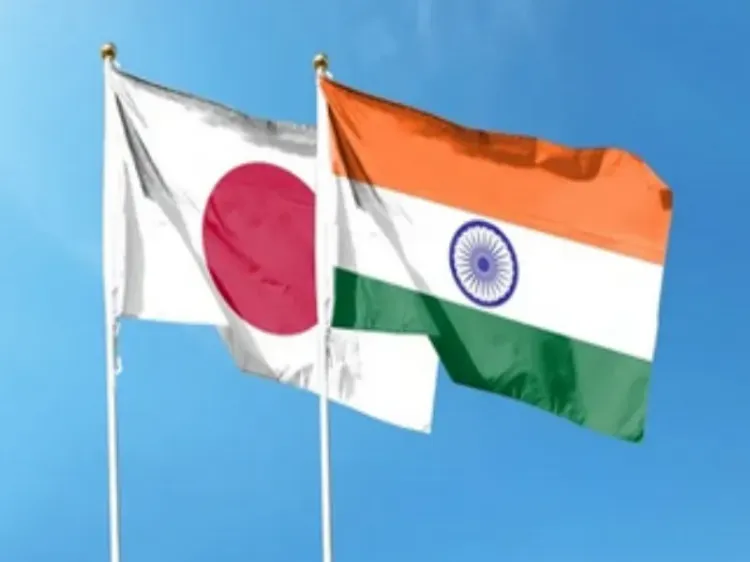Strengthening India-Japan Relations in a Changing Geopolitical Landscape

Synopsis
Key Takeaways
- Strengthening ties between India and Japan is crucial for Indo-Pacific stability.
- Cooperation should focus on security, economy, and technology.
- Addressing challenges posed by the Communist Party of China is vital.
- Investment in maritime domain awareness and digital security is essential.
- The Asia-Africa Growth Corridor offers a sustainable economic alternative.
New Delhi, March 9 (NationPress) As we look to the future, both nations must utilize their unique strengths—India's strategic location and growing global presence, paired with Japan's technological expertise and diplomatic influence—to bolster the stability of the Indo-Pacific region.
The Indo-Pacific is rapidly emerging as the focal point of global security, making it increasingly urgent for India and Japan to enhance their strategic collaboration.
In a world where authoritarian expansionism threatens sovereignty and disrupts regional equilibrium, decisive actions must be taken by both nations to uphold a rules-based order that guarantees peace and economic prosperity.
This sentiment was central to the dialogues held at a think tank in New Delhi, the Centre for Integrated and Holistic Studies (CIHS), which organized an event at the India International Centre on February 18, 2025.
Titled "Indo-Japan Relations", the event featured Minister Noriaki Abe, Minister for Political Affairs at the Embassy of Japan, as the lead speaker, alongside a distinguished group of scholars, policymakers, and security analysts.
The discussions underscored the necessity of reinforcing India-Japan relations amid an increasingly perilous geopolitical landscape.
Minister Abe offered vital perspectives on the shifting regional dynamics, stressing the importance of deeper Indo-Japanese collaboration. Topics covered included economic partnerships, security alliances, and technological cooperation—key components for ensuring regional stability. A significant focus was on the assertive stance of the Communist Party of China (CPC) in the Indo-Pacific.
From aggressive military activities in the South China Sea to economic pressure tactics and territorial invasions, the CPC's expansionist moves continue to challenge the sovereignty of neighboring countries. Its militarization of artificial islands, debt-trap diplomacy, and grey-zone strategies have heightened tensions, necessitating a strong India-Japan alliance.
As prominent democratic powers in the region, India and Japan must intensify their security and economic collaboration to address these challenges.
The informal Quadrilateral Security Dialogue (QUAD), which includes the United States and Australia, has proven effective in enhancing military interoperability, sharing intelligence, and securing crucial maritime routes. However, a vital area requiring increased focus is the security of the Malacca and Sunda Straits—critical chokepoints for global trade that are becoming more susceptible to CPC's geopolitical strategies.
The CPC's expanding influence in the region, especially through its strategic foothold in Myanmar and Cambodia, directly threatens the freedom of navigation.
A coordinated strategy between India and Japan—featuring joint patrols, intelligence exchanges, and strategic investments in infrastructure—is essential for maintaining stability. Japan's advancements in maritime technology, combined with India's naval capabilities and strategic positioning, create a powerful alliance for safeguarding maritime routes.
Both countries have also made significant investments in maritime domain awareness (MDA), a crucial aspect of deterring territorial encroachments and protecting vital trade routes.
Apart from military security, economic resilience is equally important.
The China's Belt and Road Initiative (BRI) aims to create economic dependencies, undermining national sovereignty through unsustainable debt-driven projects.
In response, India and Japan have promoted the Asia-Africa Growth Corridor (AAGC), a transparent and sustainable alternative that emphasizes local economic empowerment over exploitative financing.
Enhancing this initiative is essential—not only to counter the CPC's economic coercion but also to foster long-term regional stability.
The success of the AAGC relies on increased investment in sustainable infrastructure, digital connectivity, and capacity-building in partner countries.
By advocating for economic independence instead of dependency, India and Japan can assist developing nations in building resilience against external economic pressures. This initiative also opens new pathways for trade and investment, benefitting not just the Indo-Pacific but also enhancing Africa's economic landscape.
The digital sector is another arena where India and Japan need to strengthen collaboration. China's dominance in 5G networks, artificial intelligence, and digital infrastructure poses a clear security threat.
Beijing's state-controlled technology firms have been pivotal in cyber espionage and geopolitical maneuvering, requiring a coordinated counter-response.
By jointly investing in secure digital infrastructures, semiconductor supply chains, and advanced cybersecurity frameworks, India and Japan can protect vital technologies and infrastructure.
As the world increasingly shifts towards a digital future, cyber threats are a significant concern. Both nations must develop solid cyber resilience strategies to combat state-sponsored hacking, misinformation campaigns, and intellectual property theft.
Japan's expertise in cutting-edge technology, combined with India's strong IT and cybersecurity capabilities, makes this partnership particularly well-suited to tackling emerging digital threats.










